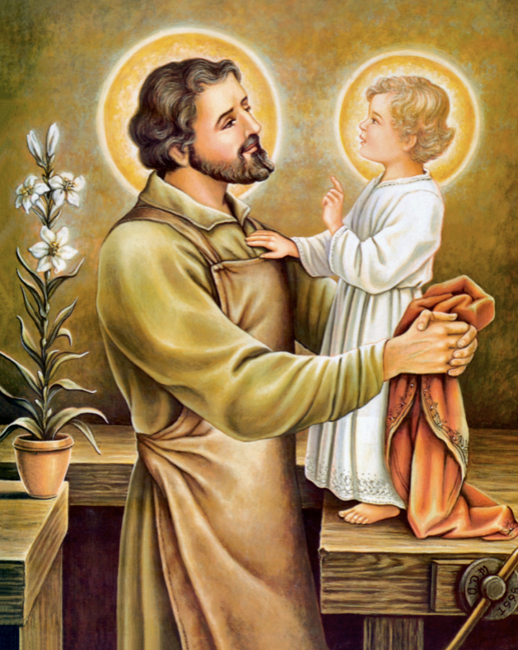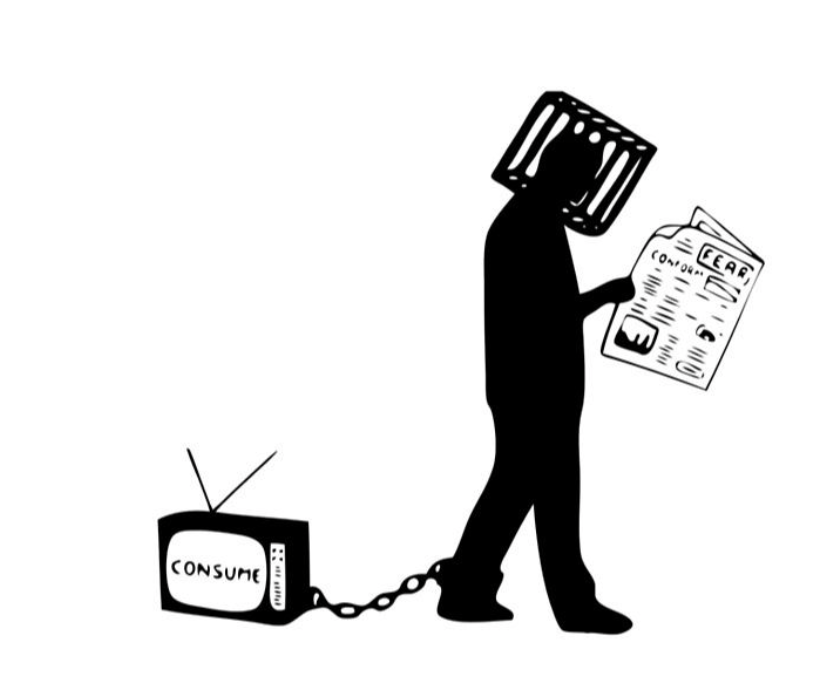1 May is the Feast of St Joseph the Worker. This day has special significance given that this year, in accordance with the wishes of Pope Francis, is specially devoted to St Joseph.

As St John Paul II says in his encyclical Laborem Exercens (1981), the human person created in the image of God, shares by his work in the activity of the Creator. Genesis is the first Gospel of work.
RESTING
The human person imitates God in working, and also in resting. God reserves rest for his servants and friends. The novel, The Remains of the Day (1989), by Kazuo Ishiguro, subsequently made into a film starring Anthony Hopkins and Emma Thompson, is about a butler so absorbed in his work, so unable to rest from his work, that he fails to respond to his father’s illness and subsequent death. The butler is complicit in the dismissal of two Jewish servant girls, later deported, and sent to their deaths in German concentration camps. The butler dismisses from his mind his employer’s pro-Nazi activities. The butler misses the opportunity of marriage with a woman who loves him, a woman whom he loves. The point of The Remains of the Day is that devotion to work, taken to an extreme, leaves us humanly stunted. Knowing how to rest, how to take time out for other important things, is an aspect of work, if we are to be fully human.
WORLDLINESS
The realisation that work is a participation in God’s activity, ought permeate even the most ordinary everyday activities. People are not deterred by the Christian message from building up the world, nor impelled to neglect the welfare of their fellows. There is a Christian worldliness which is to be esteemed and emulated. The knowledge that, by means of work, the person shares in the work of Creation constitutes the most profound motive for undertaking work.
LIVES DEFINED BY WORK
Work was the daily expression of love in the life of the Holy Family. Jesus shared in the work of St Joseph, and so was known as the carpenter’s son. Work has been redeemed by Our Lord’s death on the Cross. All this has importance for us whose lives are defined by our work. We all have an obligation to work, honestly and well. Whatever our work, it is of great value, even if it seems routine, monotonous and boring, if done well, if offered up, as St Joseph offered up his work. Even the most humble work has great value, if done with love of God, and of those one meets in the course of one’s work. That is why certain activities can never be work-being a professional thief, a con man, a slaver, a drug dealer, a pimp, a corrupt politician – and why certain sins cry to heaven for vengeance, for instance, depriving a worker of his or her wages.
NO PRICE TAG
Parents engaged in unpaid work, caring for young children, and for their homes, are engaging in work of enormous importance as they are shaping the lives of their children, and contributing without measure to the good of society. There are many things which are done by spouses which do not have a dollar price tag, but which make a house a home, and which contribute to society (e.g. visiting a sick relative, maintaining a house and garden, helping a neighbour, participating in the Rural Fire Service, mowing the nature strip, giving directions to a passer-by). Not without reason do we look back, hopefully with gratitude, to the “work” which our parents did in laying the foundations of our adult lives. The significance of this work, unpaid, and, so often unappreciated, is never to be forgotten. To restrict work to activities involving a $ value is to misunderstand what it is to a person. There are many activities in which we engage which are work, but which are incapable of being assessed in monetary terms.

And the angel answered her, “The Holy Spirit will come upon you, and the power of the Most High will overshadow you; therefore the child to be born will be called holy—the Son of God.
– Luke 1:35
RERUM NOVARUM
One hundred and thirty years ago, in 1891, Pope Leo XIII published his encyclical Rerum Novarum: on the Condition of the Working Classes. Rerum Novarum is a response in the light of the Gospel to the Industrial Revolution which, despite its positive aspects, had brought misery to many.
WORKERS
Pope Leo comments:
- government must intervene to protect both the common good, and the interests of workers, especially the poor;
- the rights of all are to be protected, not just the rich and powerful, but also workers;
- laws must be enacted to protect the rights of workers – to ensure their health and safety, to restrict excessive hours of work, to ensure a wage sufficient to support a family, to enable a family to acquire property, to protect the right of workers to form trade unions;
- subject to certain conditions, workers have the right to strike.
AUSTRALIA
Rerum Novarum influenced both legislators and judges around the world, including in Australia, through associations which proposed laws to protect the rights of workers and their families (legislation providing for recognition of trade unions, safe working conditions, protection of women, settlement of disputes, minimum wages sufficient to support a family, regulation of work in especially dangerous places such as building sites and mines, workers compensation, maximum working hours, annual holidays, sick leave, long service leave).
In Glory of our Country (2019), Professor Adrian Pabst, Professor of Politics at the University of Kent, argues that Catholic Social Teaching had a significant influence in Australia through the nascent Australian Labor Party, which was founded the very year Rerum Novarum was released.
CATHOLIC SOCIAL TEACHING
Following Rerum Novarum, succeeding popes up to Pope Francis have released encyclicals in response to contemporary problems, forming an organic body of teaching, summarised in the Compendium of the Social Doctrine of the Church.
The Church does not propose technical solutions. The Church proposes ethical indications which depend on prudential judgment for their specific application. Catholics, acting conscientiously, in the course of their work, and in political life, act on their own initiative, exercising their own judgment as to particular circumstances. In most such judgments, there is not a monolithic “Catholic” approach, but diversity. Moreover, Catholics will join forces with other persons of good will to pursue the common good.
CENTESIMUS ANNUS
One hundred years after Rerum Novarum, in 1991, St John Paul II released the encyclical Centesimus Annus: on the Hundredth Anniversary of Rerum Novarum. The circumstances were quite different, most significantly, the largely bloodless collapse, in the Velvet Revolution of 1989, of communism in Eastern Europe, and in the Soviet Union, a collapse in which St John Paul II was a key player. The Velvet Revolution started in Poland amongst Polish trade unionists including Lech Walesa at the Lenin Shipyard in Gdansk, encouraged by St John Paul II’s urging the people of Poland to peacefully stand their ground.
The assassin’s bullets which struck St John Paul II outside St Peter’s in 1981, highlight the dangers to which St John Paul II had been exposed, not only as Pope, but previously, as Archbishop of Cracow-and St John Paul II’s courage in responding to years of bullying and harassment by communist apparatchiks.
According to St John Paul II:
- The key to reading Rerum Novarum is the dignity of the worker, and the dignity of work.
- the human person is created in the image and likeness of God, and has rights which derive from human dignity.
GOODS OF EARTH FOR ALL
- the goods of this earth are for all;
- the economy is for people, not people for the economy;
- the human inadequacies of capitalism and the resulting domination of things over people is far from disappearing;
CONSUMERISM
- consumerism (an example of which is pornography) which appeals to the basest instincts – having rather than being – is to be rejected;

ALIENATION
- ‘alienation’ involving a reversal of means and ends, is exemplified by a consumerism where persons are ensnared in a web of false and superficial gratifications rather than being helped to experience their personhood in an authentic and concrete way;
- alienation is found in work, when it is organised to ensure maximum profit with no concern for the worker;
CAPITALISM
- capitalism is acceptable only if it is circumscribed within a strong juridical framework, which respects human freedom in its totality, the core of which is both ethical and religious;
- capitalism is not acceptable when exclusively directed to making a profit, when it exploits workers and consumers, when it has no regard to the common good;
RULE OF LAW
- respect for the rule of law is essential to good government;
- the division of power between the legislature, the executive and the judiciary is desirable for good government;
TOTALITARIANISM
- the root of modern totalitarianism is to be found in the denial of the transcendent dignity of the human person who, as the visible image of the invisible God, is by nature the subject of rights which no one may violate;
- not even a majority may violate these rights, by going against a minority, by isolating, oppressing or exploiting the minority or attempting to annihilate it;
- totalitarian government cannot tolerate the affirmation of an objective criterion of good and evil beyond the will of those in power;
DEMOCRACY
- democracy values the participation of citizens in making political choices, and guaranteeing the possibility both of electing and holding accountable those who govern them, and of replacing them through peaceful means when appropriate;
- authentic democracy is inconsistent with the formation of narrow ruling groups which usurp the power of the state for individual interests or ideological ends;
- authentic democracy is possible only in a state ruled by law, and on the basis of a correct conception of the human person;
RELATIVISM
- there is a tendency today to claim that agnosticism and sceptical relativism are the philosophy and basic attitude which correspond to democratic forms of political life;
- if there is no ultimate truth to guide and direct political activity then ideas and convictions can easily be manipulated for reasons of power;
HUMAN RIGHTS
- explicit recognition of human rights is necessary for good government;
HUMAN PERSON
- the principle which inspires the Church’s social doctrine is care and responsibility for each and every person, not in the abstract, but for this person, for that person;
- in the mystery of the Redemption Christ united himself with each and every person forever.
- The human person is the primary route the Church must travel in fulfilling her mission, the way traced out by Christ himself.
JESUS MAN OF WORK
Catholic Social Teaching continues with Pope Francis, most notably in his encyclical Laudato si: on Care for Our Common Home (2015). Jesus of Nazareth was a man of work, like Joseph, to all the world his father. Jesus, both in his parables, and in his teaching, looks with love upon human work.
Michael McAuley
Feast of St Joseph the Worker
1 May 2021
